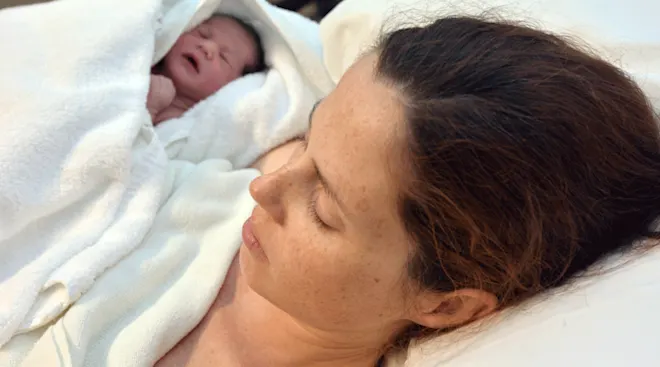Cryptic Pregnancy: Can You Really Not Know You’re Pregnant?
Pregnancy is typically a dramatic event, to say the least. You might experience symptoms like weight gain, nausea and vomiting, back pain, fatigue and many more, not to mention major mood swings and sometimes-painful kicks.
Yet some pregnant people and moms-to-be have no idea they’re pregnant—and no, this isn’t just the stuff of reality shows. While cryptic pregnancy isn’t super common, it definitely happens. Here’s what to know about cryptic pregnancy, including potential causes, signs and symptoms, and how it could affect Mom and baby—plus, read three real stories about cryptic pregnancy.
A cryptic pregnancy, aka a stealth pregnancy, is when a pregnant person doesn’t know they’re pregnant—in some cases not realizing it until labor begins, per Cleveland Clinic.
A 2002 study found that about one out of 475 pregnant women didn’t realize she was pregnant until about 20 weeks gestation. And about one in 2,500 women didn’t know she was pregnant until she went into labor. In other words, “It’s not common at all,” says Layan Alrahmani, MD, an ob-gyn and maternal-fetal medicine specialist at Loyola Medicine.
There are several reasons a cryptic pregnancy might happen, says Melissa Terry, MD, an ob-gyn with University of Missouri Health Care:
- History of irregular periods or infertility. Medical conditions such as polycystic ovary syndrome (PCOS) can cause irregular periods and make it hard to figure out if you’re pregnant. Plus, if healthcare providers have told you you can’t get pregnant or have very slim chances due to a health condition, pregnancy might take you by surprise.
- Perimenopause. As you get closer to menopause, your periods might become more irregular—and you might think getting pregnant is unlikely. However, as long as you’re menstruating, you can still get pregnant.
- Pregnancy test malfunction. If you take a pregnancy test too early, don’t follow the directions correctly or it’s an expired test, you could get a false negative. (Adds Alrahmani: Beyond the first trimester, an at-home pregnancy test may not detect you’re pregnant—but a blood test performed by your doctor will.)
- Birth control failure. While it’s uncommon, there’s still a small chance you could get pregnant if you’re using birth control—and not realize it since some birth control methods can stop your period.
- Irregular bleeding in early pregnancy. “Some women have bleeding in early pregnancy, either due to implantation of an embryo or due to a threatened miscarriage,” says Terry. “A woman might not realize that she should take a pregnancy test if she has these types of bleeding in early pregnancy, since she might think that she’s just having a period.”
- Not knowing about the signs and symptoms of pregnancy. Some women and birthing people, particularly younger ones and those who’ve never been pregnant, might not recognize the typical symptoms of early pregnancy, like a missed period, nausea and vomiting, or breast tenderness—and some might not recognize fetal movement, which starts around 18 to 20 weeks.
- Body shape and size. Some people don’t gain much weight in pregnancy and might not have a visible baby bump.
- Denial or shame. Some might feel embarrassed about an unplanned pregnancy and have difficulty admitting to themselves it’s real. Mental health issues like depression can also cause denial of pregnancy symptoms.
- Recent pregnancy or breastfeeding. It’s possible to get pregnant again within a few months of giving birth, even if your period hasn’t come back yet. “If this happens, a woman might assume that she’s not having periods due to breastfeeding rather than a new pregnancy,” says Terry.
Terry says the early signs and symptoms of pregnancy include a missed period, breast tenderness, fatigue, nausea and vomiting, light vaginal bleeding and pelvic cramping, while later signs of pregnancy include weight gain, expanding belly size and fetal movement. However, according to the American Pregnancy Association, not everyone feels all these symptoms, and some people might attribute them to being sick, or changes in diet or lifestyle.
The biggest consequences of a cryptic pregnancy result from a lack of prenatal care, says Terry. There are a few ways limited prenatal care could negatively impact you and baby, including increasing the risk of preterm labor and delivery, fetal growth restriction and postpartum mood disorders, she says. Additionally, prenatal care can help you manage any medical conditions during pregnancy and transition to pregnancy-safe medication, if needed. Plus, seeing a healthcare provider can help you make the right choices when it comes to smoking and using other substances during pregnancy. Finally, there could be risks to your labor and delivery: “In the most extreme cases, women may not realize that they’re pregnant until they start experiencing labor and present to a hospital with complaints of pain and bleeding,” says Terry.
If you find out you’re pregnant before labor and delivery, you should schedule a prenatal care appointment as soon as possible, says Terry. Your provider will perform an ultrasound to confirm baby’s gestational age, as well as evaluate you for conditions such as gestational diabetes and high blood pressure. It’s also important to consider connecting with a mental health provider if you’ve experienced cryptic pregnancy. “Perinatal psychiatrists or counselors are extremely helpful for women who struggle with depression or anxiety, as well as denial of the pregnancy,” says Terry. “Some clinics or institutions also have perinatal social workers who can connect women with community or state resources that can help make pregnancy and having a baby less of a financial burden.”
When it comes to cryptic pregnancy, experiences and symptoms can vary a lot. Here, real women share their stories.
“I was 8 months pregnant when I found out I was having my first child. I was in disbelief. I went for a checkup in June 2017, and was told I had a miscarriage and had already passed all the tissue. I missed my period that August, and all the pregnancy tests were negative except for one. I went again to see my doctor in mid-September, he measured me, then came back in with a mini-sonogram machine…and there was a full-blown baby! I was 31 weeks. I had my son on November 29, 2017, at 40 weeks and 5 days.
“I didn’t realize I was pregnant because I continued to have regular periods after the miscarriage. I didn’t gain much weight or even look pregnant until after I found out about my son. It was weird to see myself looking normal one week, and then a week later I was almost full-term. The female body is the most amazing thing!” —Joshlin J., Mississippi
“I was 21 years old and approximately 32 weeks along when I found out I was pregnant. I had been feeling sick, but after a day at an Orlando theme park, I had awful side pain and was throwing up. My boyfriend took me to urgent care near his house, where they ran a pregnancy test, which was negative. The doctor suggested I was dehydrated and needed to rest, but my mom didn’t agree and took me to the ER. Again, they ran a pregnancy test—still negative—and started running a host of other tests. They thought I had a kidney stone based on my symptoms, and sent me for an X-ray. After I got one, the doctor came in and said I needed to leave the X-ray room immediately because there was a very developed fetus curled up right along my tailbone. I remember the total shock in the ER as they wheeled me out of the X-ray room through the hall.
“I had been diagnosed with mono months before this big reveal because I was exhausted all the time. I had four negative pregnancy tests, including the two on the day I found out I was pregnant. I continued to have my period, although it was much lighter and didn’t come with the normal cramping. I gained and lost weight throughout that year. I didn’t look pregnant, something I attribute to being 5’11," and the fact that my son was wedged way back against my spine. Thankfully, I didn’t do drugs or drink a lot, despite being a senior in college, and my son was born a healthy 8 pound 10 ounce baby.” —Jen S., Florida
“I truly had no idea I was pregnant! I hadn’t had a period in about five years due to a combination of prolonged birth control use, weight gain since COVID and hitting a severe depressive episode during the time that I’d been pregnant. I never carried weight that made me look pregnant, and I never felt my daughter move or kick. The day that I ended up giving birth, I thought I was getting a period for the first time in years because I was cramping and bleeding. I woke up in the morning with severe pain that went on for several hours before going to the bathroom, sitting down on the toilet, and realizing something wasn’t right.
“I was in excruciating pain and told my roommate to call an ambulance—but before she even had the chance, I reached down between my legs and felt what we now know was my daughter’s toes (yes, she was breech!). My first thought was that my uterus had prolapsed. Suddenly there was a baby feet-first in our toilet, she began to cry and my roommate scooped her out. The paramedics were arriving at this point—they cut the umbilical cord and I birthed the placenta before they got us into the ambulance to take us to the nearest hospital.
“This was a week away from my 31st birthday. I was scared and had no idea what to do, but when they gave my daughter back to me after running tests on her, and I held her and looked at her again, all of that melted away. I never thought I would have children, and now I can’t imagine my life without her.” —Diney H., Texas
Many women with cryptic pregnancies are able to have healthy babies, but there are potential risks to Mom and baby if you don’t receive the right prenatal care. If you suspect you might be pregnant, be sure to check in with your healthcare provider—even if you’re not experiencing the typical symptoms or your pregnancy test is negative.
Please note: The Bump and the materials and information it contains are not intended to, and do not constitute, medical or other health advice or diagnosis and should not be used as such. You should always consult with a qualified physician or health professional about your specific circumstances.
Plus, more from The Bump:
Layan Alrahmani, MD, is an ob-gyn and maternal-fetal medicine specialist at Loyola Medicine in the Chicago area. She received her medical degree from the University of Jordan.
Melissa Terry, MD, is an ob-gyn with University of Missouri Health Care. She received her medical degree from University of Missouri Columbia.
Cleveland Clinic, Cryptic Pregnancy, November 2022
American Pregnancy Association, What is a Cryptic Pregnancy?
Learn how we ensure the accuracy of our content through our editorial and medical review process.
Navigate forward to interact with the calendar and select a date. Press the question mark key to get the keyboard shortcuts for changing dates.





















































